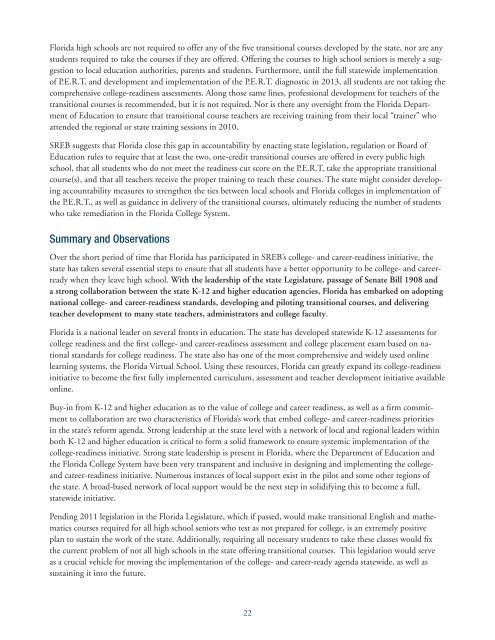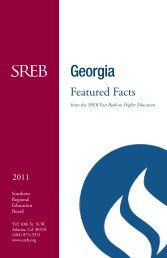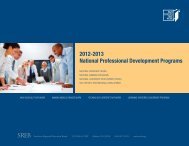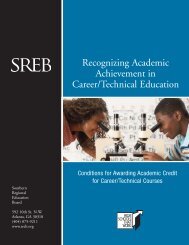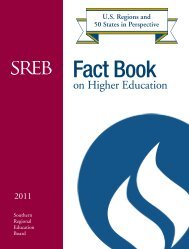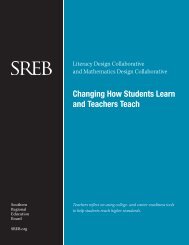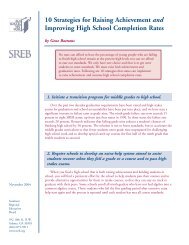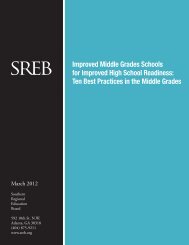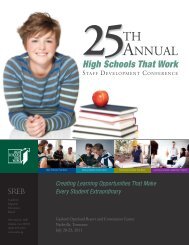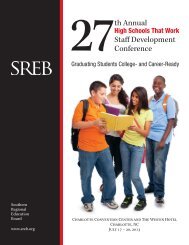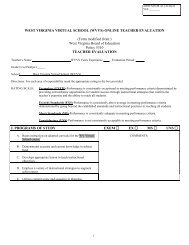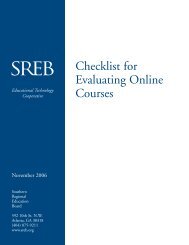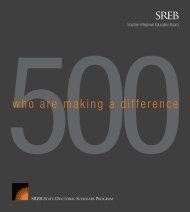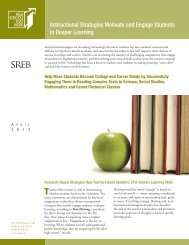Final Progress Reports - Southern Regional Education Board
Final Progress Reports - Southern Regional Education Board
Final Progress Reports - Southern Regional Education Board
You also want an ePaper? Increase the reach of your titles
YUMPU automatically turns print PDFs into web optimized ePapers that Google loves.
Florida high schools are not required to offer any of the five transitional courses developed by the state, nor are any<br />
students required to take the courses if they are offered. Offering the courses to high school seniors is merely a suggestion<br />
to local education authorities, parents and students. Furthermore, until the full statewide implementation<br />
of P.E.R.T. and development and implementation of the P.E.R.T. diagnostic in 2013, all students are not taking the<br />
comprehensive college-readiness assessments. Along those same lines, professional development for teachers of the<br />
transitional courses is recommended, but it is not required. Nor is there any oversight from the Florida Department<br />
of <strong>Education</strong> to ensure that transitional course teachers are receiving training from their local “trainer” who<br />
attended the regional or state training sessions in 2010.<br />
SREB suggests that Florida close this gap in accountability by enacting state legislation, regulation or <strong>Board</strong> of<br />
<strong>Education</strong> rules to require that at least the two, one-credit transitional courses are offered in every public high<br />
school, that all students who do not meet the readiness cut score on the P.E.R.T. take the appropriate transitional<br />
course(s), and that all teachers receive the proper training to teach these courses. The state might consider developing<br />
accountability measures to strengthen the ties between local schools and Florida colleges in implementation of<br />
the P.E.R.T., as well as guidance in delivery of the transitional courses, ultimately reducing the number of students<br />
who take remediation in the Florida College System.<br />
Summary and Observations<br />
Over the short period of time that Florida has participated in SREB’s college- and career-readiness initiative, the<br />
state has taken several essential steps to ensure that all students have a better opportunity to be college- and careerready<br />
when they leave high school. With the leadership of the state Legislature, passage of Senate Bill 1908 and<br />
a strong collaboration between the state K-12 and higher education agencies, Florida has embarked on adopting<br />
national college- and career-readiness standards, developing and piloting transitional courses, and delivering<br />
teacher development to many state teachers, administrators and college faculty.<br />
Florida is a national leader on several fronts in education. The state has developed statewide K-12 assessments for<br />
college readiness and the first college- and career-readiness assessment and college placement exam based on national<br />
standards for college readiness. The state also has one of the most comprehensive and widely used online<br />
learning systems, the Florida Virtual School. Using these resources, Florida can greatly expand its college-readiness<br />
initiative to become the first fully implemented curriculum, assessment and teacher development initiative available<br />
online.<br />
Buy-in from K-12 and higher education as to the value of college and career readiness, as well as a firm commitment<br />
to collaboration are two characteristics of Florida’s work that embed college- and career-readiness priorities<br />
in the state’s reform agenda. Strong leadership at the state level with a network of local and regional leaders within<br />
both K-12 and higher education is critical to form a solid framework to ensure systemic implementation of the<br />
college-readiness initiative. Strong state leadership is present in Florida, where the Department of <strong>Education</strong> and<br />
the Florida College System have been very transparent and inclusive in designing and implementing the collegeand<br />
career-readiness initiative. Numerous instances of local support exist in the pilot and some other regions of<br />
the state. A broad-based network of local support would be the next step in solidifying this to become a full,<br />
statewide initiative.<br />
Pending 2011 legislation in the Florida Legislature, which if passed, would make transitional English and mathematics<br />
courses required for all high school seniors who test as not prepared for college, is an extremely positive<br />
plan to sustain the work of the state. Additionally, requiring all necessary students to take these classes would fix<br />
the current problem of not all high schools in the state offering transitional courses. This legislation would serve<br />
as a crucial vehicle for moving the implementation of the college- and career-ready agenda statewide, as well as<br />
sustaining it into the future.<br />
22


